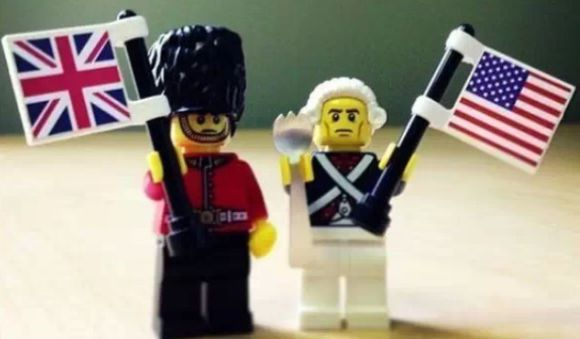The difference between British English and American English-British phrases that confuse Americans
Xiaobian once had an article showing part.American phrases that confuse the BritishNow let’s change our minds and look at some confusing English phrases. The origins of some idioms or idioms commonly used by the British are ambiguous, which makes the pro-British people afraid that they are not used to these unusual expressions.

1. They’re chalk and cheese. What does it mean?
A. They’re very different.
B. They’re looking pale.
C. They’re very fickle.
2. Bob’s your uncle! What does it mean?
A. You used nepotism.
B. What a coincidence!
C. You come from a rural area.
D. The task is easily achieved.
3. I’ve known her for donkey’s. What does it mean?
A. I’ve known her for a very long time.
B. She’s a jerk.
C. I don’t trust her.
D. I know a lot of her secrets.
4. Something for the weekend. What does it mean?
A. A condom
B. A time-consuming hobby
C. Marijuana
D. A duvet
5. At Her Majesty’s pleasure. What does it mean?
A. A lazy morning
B. Waiting for somebody slow
C. A beautiful sunset
D. In prison
6. Swings and roundabouts. What does it mean?
A. Ways of avoiding problem
B. Obstacles that prevent you getting somewhere
C. Gains and losses that offset each other
D. Perks of a job that aren’t mentioned in the job advert
7. Horses for courses. What does it mean?
A. Somebody wearing cloths suited to a younger person
B. Food that looks good by tastes terrible
C. A very competitive race
D. Different things suit different people
8. He’s got the hump.
A. He’s in love
B. He’s very hungry
C. He’s annoyed
D. He can drink a lot of alcohol without getting drunk
9. I need to spend a penny
A. I’m addicted to candy
B. I can’t afford to go abroad this year
C. I need to go to the toilet
D. I need to change my shoes
10. He’s on the pull
A. He’s going to get promoted
B. He relies on charity
C. He’s hoping to have sex with someone
D. He’s driving
Are you ready to read the answer? Pull down!
1. A
"challenge and cheese" is equivalent to "apples and oranges" said by Americans. It describes that two things or people are completely different or completely incompatible. The usual sentence pattern is "like/as different as challenge and cheese", for example, we’ll never get on-we’re like challenge and cheese.
2. D
"Bob’s your uncle" is said to have originated from Arthur Balfour. He was appointed to several prestigious positions by his uncle Robert Cecil (nicknamed Bob), and now it is used to indicate that he can finish a task easily. For example, put together a couple of kitchen fittings, buy a coffee machine and Bob’s your uncle.
3. A
"Donkey’s" is usually a shorthand for "donkey’s years". At first, it may be written as donkey’s ears, which means that something is very long in length, but now it means a long time. For example, we’ve been close friends for donkey’s years.
4. A
Incredibly, "Something for the weekend" refers to condoms. People usually think that this is a euphemism when barbers selling condoms sell them to customers, such as "something for the weekend, sir? "
5. D
"His Sharp Practice Costhim a $ TERM at Her Majesty’s pleasure", if someone at her majesty’s pleasure, then he is being held in a British prison. This phrase was formed because the monarch initially had the right to decide freely whether to detain someone.
6. C
Swings and roundabouts in British English mean "different actions or choices will eventually lead to no gains or losses, or gains and losses will offset each other". Does it mean that different roads lead to the same goal, or that the lost corner will reap the mulberry? A more complete phrase is "to gain on the swings and lose on the roundabouts". For example, I don’t want to have to, but it’s swings and roundabouts
7. D
Horses for courses is an English proverb, which means "different people are suitable for different things", and its origin is the phrase "different race horses would be better on different race courses/different horse races have better performances on different tracks", which really has their own strengths or different meanings. For example, so I’m not interested in politics, it’s horses for courses.
8. C
The origin of the phrase get/have/give someone the hump is not clear, and it may be related to camels, which means "to become angry or lose one’s temper for no reason", such as "fans get the hump when they lose" or "debate has been beening about road safety, with people across London getting the hump."
9. C
In Britain, it used to cost a penny to use a coin-operated public toilet once, which is a euphemism for the phrase spend a penny instead of "urinating", such as "you can’t get to sleep when you want to spend a penny".
10. C
There seems to be a clear correlation between pull and attributes in the example. The phrase on the pull refers to an attempt to attract someone to bed in British informal context, such as "an eligible bachelor on the pull" or "I remember now why I’m not interested in going on the pull."
(Source: Oxford Dictionary WeChat WeChat official account Editor: Julie)